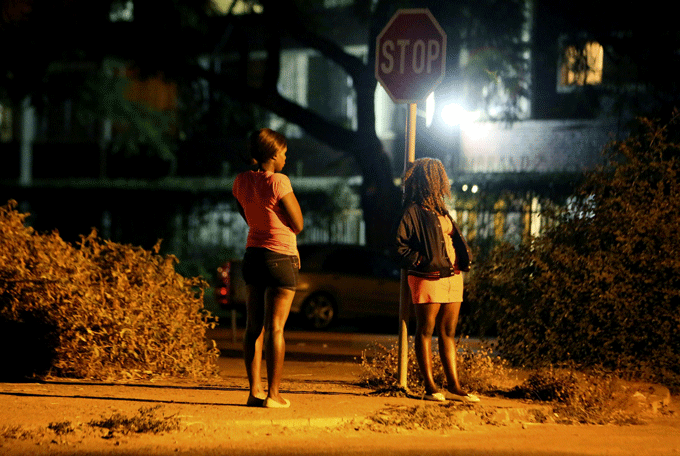
Emily was only 20 years old when her husband abandoned her and their children. She turned to sex work. She knew there was the risk of HIV, violent clients and jail because it’s illegal in Zimbabwe. What she never imagined was that 25 years later, she’d still be in it.
“Some days I get so desperate I wonder how I am going to feed my children,” she says.
Emily, along with most women interviewed, asked to use only their first names because of stigma. When Emily began sex work, she learned that she could protect herself by having regular clients, who were unlikely to be violent and were easy to convince to use contraceptives. Nearly two years ago, everything changed. Her work became even more dangerous.
As coronavirus-related restrictions cause economic devastation around the world, Zimbabwean sex workers say they’re forced to take even greater risks. Job losses have rendered men unable to pay for sex, and the government has periodically closed bars, nightclubs and lodges, which are usually the safest places to meet clients. Many are soliciting men they normally would avoid, including cross-border drivers, who sometimes abandon them in foreign countries.
Emily says she frequently follows men to places she would never have gone before the pandemic. Men have assaulted and robbed her for refusing to have unprotected sex. Others have forced her to have sex with their friends without pay.
“Very few men treat us fairly nowadays,” she says.
Hazel Zemura, the director of All Women Advocacy, a grassroots organisation led by sex workers, says women like Emily often have nowhere to turn for help.
“Because what they do is illegal, they can’t seek protection from the state,” she says.
- Chamisa under fire over US$120K donation
- Mavhunga puts DeMbare into Chibuku quarterfinals
- Pension funds bet on Cabora Bassa oilfields
- Councils defy govt fire tender directive
Keep Reading
Zimbabwe is one of 103 countries where sex work is illegal, leaving the country’s estimated 45 000 women in the industry vulnerable to violence and exploitation, according to a UNAIDS report. About 42% of the country’s sex workers are HIV positive, the report says, and they face discrimination, including from health care workers.
Women like Irene, a widow who started sex work three years ago to provide for her two children, say they are getting into even riskier situations.
“Cross-border truck drivers are the ‘in thing’ during these Covid times because they have a bit of cash to spare,” Irene says. “I try to stay as safe by using condoms, but sometimes I come across one who doesn’t want to comply.”
The prevalence of HIV infections among people working in southern Africa’s transportation sector is among the highest in the world, according to a report by the International Labour Organization. It’s even higher among cross-border drivers because many seek sex workers during long periods on the road.
Cross-border drivers are sometimes worth the risk, Irene says, because they give women free rides to neighbouring South Africa and Zambia, where they buy low-priced merchandise like cosmetics to sell in Zimbabwe. But that presents another kind of danger.
“We have had to assist women who get abandoned in foreign countries when truck drivers no longer need them,” Zemura says.
“Some days I get so desperate I wonder how I am going to feed my children.”
Contracting the coronavirus itself is another risk. Zemura says her organisation has been encouraging sex workers to get vaccinated. Although only about 15% of people in Africa have received at least one shot of the Covid-19 vaccine, Zimbabwe is doing much better than most countries on the continent. An estimated 21% of Zimbabweans are fully vaccinated, and 28% have received the first shot. That’s still far below the world average of nearly 53%, and Zimbabweans endure long lines at vaccination clinics.
Zemura says All Women Advocacy has worked to convince sex workers that getting vaccinated is worth their time. “A significant number of them has been fully vaccinated,” she says.
Talent Madziva, founder and director of Katswe Sistahood, which advocates for women’s sexual and reproductive health services, sees sex work as a political issue. She believes the plight of sex workers can end only if their work is decriminalised. “Almost every problem sex workers face is due to the fact that they can’t report violations without being criminalised,” she says.
But Gabriel Jaji, the acting provincial development officer at the Ministry of Women’s Affairs, says that even without decriminalization, sex workers can still get justice. Perpetrators can be prosecuted under the Domestic Violence Act of 2006, which criminalizes violence against intimate partners.
“When women report violence to us, we don’t consider the acts they were engaged in when they were assaulted,” Jaji says.
The law requires the government to set up areas where women can obtain services including legal and psychological support, Jaji says, and safe houses for women fleeing violence.
Sex workers have won one legal victory, a 2015 landmark ruling by the Constitutional Court of Zimbabwe that said a woman couldn’t be charged with soliciting sex for merely being in a bar or nightclub. Zemura, the advocacy organisation director, considers steps toward economic empowerment more realistic. Since the pandemic began, many of the women her organisation serves have expressed a desire to leave sex work.
“Most women doing sex work never planned to be there,” she says. “No one grows up with the ambition of wanting to be a sex worker.”
But like decriminalisation, that’s a long-term remedy that won’t end the current crisis. Many, like one woman named Melody, say they’re just hoping the pandemic will pass so they can return to the relative safety of bars and nightclubs.
“If you want to be picky during this pandemic, you will die of hunger,” Melody says. “God is the only one looking after us in this situation.” —Global Press Journal










